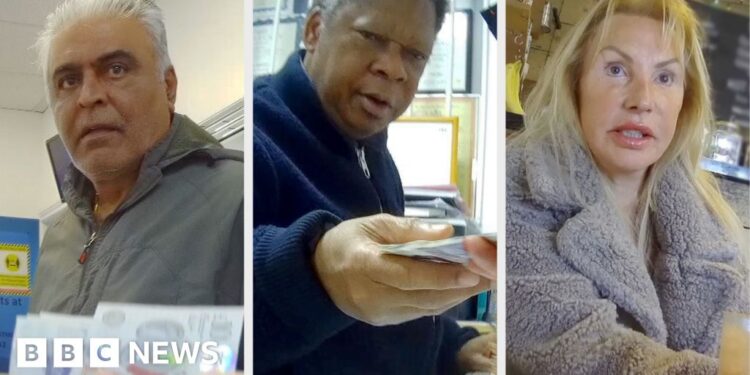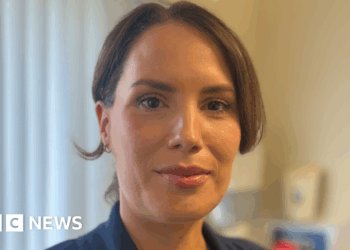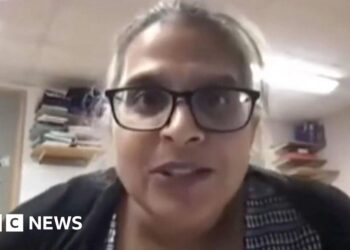Guy LynnBBC Investigations, London
 BBC
BBCNurses and pharmacists have been putting patients at risk by supplying Botox without proper checks, a BBC undercover investigation has found.
Researchers posing as beauticians secretly filmed a nurse trading prescriptions over WhatsApp, a pharmacist coaching clients to falsify records and a bogus doctor handing over Korean toxin vials for cash.
Medical rules require an in-person consultation and prescription to check Botox is suitable. Skipping these safeguards raises the risk of complications such as drooping eyelids, headaches or, in rare cases, respiratory failure or death.
The pharmacists’ regulator said it was “very concerned” while the nurses’ regulator said it would review the evidence.
Botulinum toxin – commonly known by the brand name Botox – is also sold under several other licensed brands in the UK, including Azzalure, Bocouture and Dysport.
According to market analysts Precision Business Insights, the UK botulinum toxin market was worth about £115m in 2024 and is forecast to reach nearly £295m by 2031.
Botox is a prescription-only medicine, and while many people now receive injections from high-street beauticians, the law requires a doctor, dentist, nurse prescriber or pharmacist prescriber to first examine the patient in person and issue a prescription confirming it is safe to proceed.
Over several months, BBC researchers gathered evidence of trusted medical professionals sidestepping the rules. Secret recording captured transactions from high-street clinics to online sellers, revealing how unsafe and illegal practices have spread across England’s booming aesthetics market.
‘Same old crap’
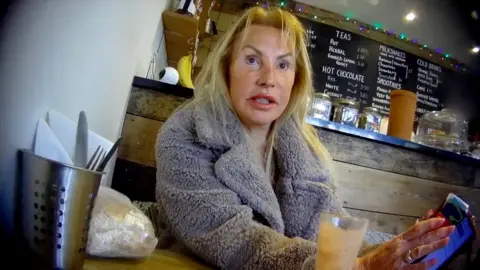
In a café in Christchurch, Dorset, our undercover researcher posed as a beautician seeking prescriptions and the Botox stock needed to inject clients at a new beauty clinic.
Across the table sat Poole-based senior nurse prescriber Sally Jackson, who ran a business supplying beauticians in this way. As a prescriber, she was required under professional rules to meet and examine each patient in person before issuing a prescription, the document that allows beauticians on the high street to inject.
Ms Jackson acknowledged those rules but then brushed them aside. “I’m supposed to do a face-to-face consultation. But we can do it the other way, WhatsApp me,” she said.
When pressed on whether she should speak to clients who would be her patients, to whom she owed a duty of care, she was blunter still. “I should talk to them, but I won’t,” she admitted, dismissing the checks as “same old crap”.
For £30, she issued a prescription, later obtained by the BBC from the pharmacy she directed, for a patient she had never met, whose details were sent to her on WhatsApp.
Once a private practitioner in London’s exclusive Harley Street, Ms Jackson was now selling shortcuts to beauticians nationwide, telling our researcher: “I’m so busy.”
She also offered to prescribe extra vials on a genuine patient’s script – allowing beauticians to keep stock for clients and then inject them secretly, with no prescription in place. Prescribing a drug in one person’s name for use on another constitutes fraud.
Ms Jackson ignored repeated requests for comment. When confronted in person, she replied: “I am not interested.”
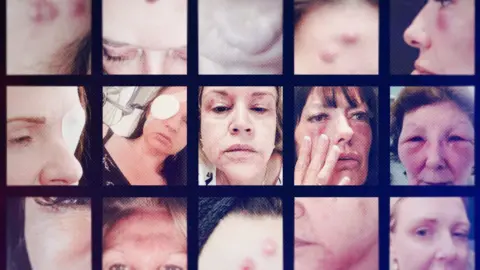
“Botox is safe when used properly – but the checks exist for a reason,” said Cheryl Barton, lead nurse at the Aesthetika clinic near Sheffield, who often gives expert evidence in malpractice cases.
“The truth is that shortcuts by registered and regulated medical professionals who should know better are an open secret in the industry. Prescribers are supposed to see patients face to face and issue a valid prescription – but too often they don’t.”
Without those safeguards, explained Barton, prescribers can miss vital conditions that make treatment unsafe, or channel counterfeit and unlicensed products on to the market. Misuse of botulinum toxin can cause serious harm – from headaches and blurred vision to, in rare cases, respiratory failure or even death.
Official figures back up her concerns. The UK medicines regulator recorded 52 suspected Botox-related complications in 2019, rising to 225 in 2024, with 141 already logged this year. Since 2015, 12 deaths have been recorded.
For patients such as Antonia Hannah, from Twickenham, west London, the impact can be devastating. She booked Botox as a birthday treat, but the qualified practitioner gave her no proper consultation, asked no questions about her medical history and failed to assess whether the treatment was suitable.
Within days her eyelid had drooped and swelled. “It was constant discomfort and pain, like glass in your eyes,” she said. “I’d be out shopping with my daughter, glance in a mirror, and just burst into tears.”
‘You’re going to do it illegally’
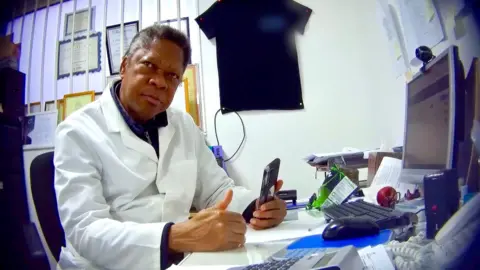
In east London, pharmacist prescriber Cornelius Agoye was also willing to prescribe without any consultation, handing over vials of Botox for cash with no patient in sight.
He met a second undercover researcher, posing as a beautician wanting prescriptions and stock for clients, and to cover his tracks told us to fill in records as if a consultation had taken place: “I did face-to-face consultation today… I’ve just done it,” he said.
He then explained to us the same fraudulent practice of using prescriptions for one patient to obtain extra stock to be used on others.
Asked about the legality of this, his answer was blunt: “Yeah, you’re going to do it illegally… That’s what you’re doing. I didn’t tell you anything.”
The BBC wrote to Mr Agoye, a registered and trusted community pharmacist, seeking an explanation for his behaviour.
He apologised and admitted falling below professional standards and said he meant no harm.
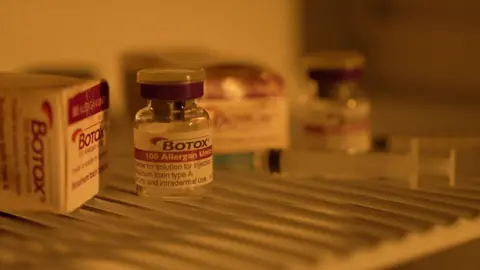
Earlier this year, a sudden outbreak of botulism across England left dozens of young women in hospital, some partially paralysed, after being injected with black-market Korean toxin sold by beauticians as a Botox-style treatment. It highlighted the dangers of unlicensed products — and led the BBC to investigate those behind the trade in London.
The team uncovered a bogus doctor selling unlicensed Botox. In north London, Prakash Gurnani — who runs Beauty Aesthetics and Wellbeing in Golders Green — introduced himself to our undercover researcher as a “skin doctor”. In reality he is not a doctor at all, and misleading clients in this way is a criminal offence.
When asked about Botox, he immediately offered a cheaper Korean alternative. The Korean vials were unlicensed botulinum toxin products, marketed as having the same wrinkle-smoothing effect. They’re potentially dangerous because they aren’t regulated or tested in the UK, so their contents and safety, or whether they are counterfeit, are unknown.
He sold a vial for £149, with no prescription and no safeguards, and admitted he had been trading unlicensed products for years across the UK including throughout the Covid period.
‘They are young girls and there’s no problem’
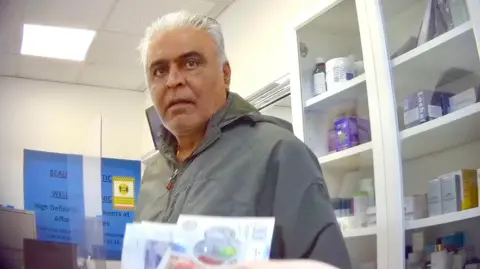
Mr Gurnani described holding Botox parties where groups of young women were injected with the same illegal Korean toxin. He told our researcher to hide what was really being injected. “Just say ‘tox’,” he instructed. “Don’t use ‘Botox’, just say ‘anti-wrinkle’. Keep it quiet. They are young girls and there’s no problem – just treat them with Korean tox.”
When asked about the risks by the researcher, he brushed them aside. “Very safe. As long as they don’t open their mouth,” he said, referring not to any medical issue, but to the risk of being caught.
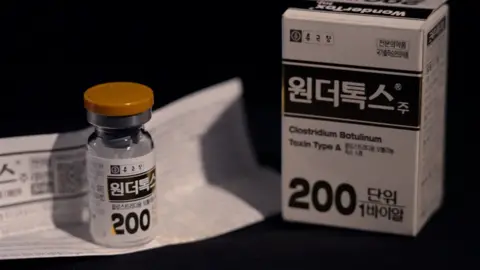
His activities stretched beyond Botox. He also sold the BBC powerful prescription-only weight-loss drugs such as Mounjaro, despite not being qualified to prescribe them, and even suggested injecting one of our reporters with an illegally obtained anaesthetic as part of a cosmetic procedure.
The BBC had only given him the scantest of details, and a pharmacy which issued the prescription and supplied the weight loss drugs said he had tricked them by posing as a doctor — a claim Mr Gurnani later disputed.
Mr Gurnani ignored all requests for comment, and when confronted by the BBC denied offering Botox illegally or asking clients to break the law.
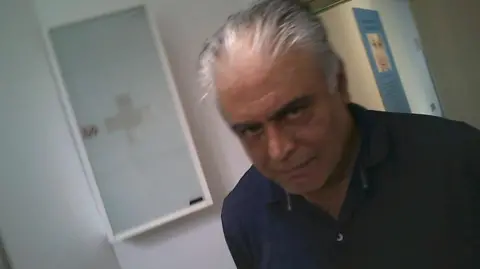
The cases of Sally Jackson, Cornelius Agoye and Prakash Gurnani were not isolated.
The BBC received reports from other parts of England of registered medical professionals breaking the rules, and some of them spoke directly to our undercover researcher.
One pharmacist also admitted he was not carrying out the required face-to-face consultations and suggested faking photographs to trick regulators into thinking they had taken place.
Another nurse was found issuing prescriptions on the basis of the barest patient details, and, after the Nursing and Midwifery Council (NMC) tightened its guidelines in June, admitted she was prepared to “be a bit greyer” and carry on without proper consultations.
Medical experts told the BBC such practices stripped away the most basic safeguards and put large numbers of patients at risk.
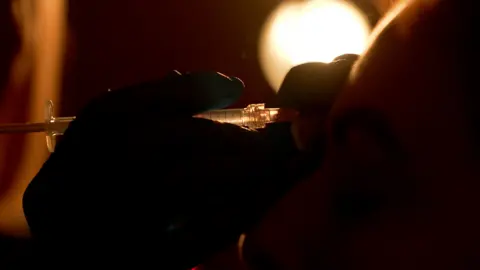
The BBC wrote to the NMC, which regulates nurses across the UK. It said prescribers must see patients face to face before issuing prescriptions for cosmetic procedures, and promised to review the evidence from this investigation and act on breaches.
The BBC also approached the General Pharmaceutical Council. It said it was “very concerned” by the findings, stressing that Botox prescriptions always require a physical examination and that enforcement action would follow where standards were not met.
The BBC further asked the Department of Health and Social Care about the issues raised. It said the cosmetics industry had long been plagued by unlicensed practitioners and confirmed the government was assessing reforms, including tougher licensing of non-medical professionals such as beauticians.
But when repeatedly asked about the central finding of this investigation – that trusted medical professionals are themselves breaking the rules and putting patients at risk – the department did not offer a response and declined an interview with Health Secretary Wes Streeting.
With extra reporting by Shabnam Mahmood and Dolly Carter
- If you have more information about this story, you can reach Guy in confidence by email at [email protected]
Source link : https://www.bbc.com/news/articles/cn82z3grpd3o?at_medium=RSS&at_campaign=rss
Author :
Publish date : 2025-09-30 00:45:00
Copyright for syndicated content belongs to the linked Source.

